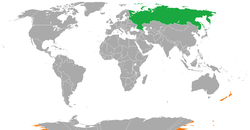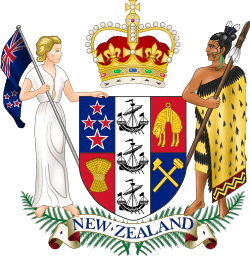New Zealand–Russia relations
 |
|
Russia |
New Zealand |
|---|---|
New Zealand–Russia relations refers to bilateral foreign relations between New Zealand and Russia. New Zealand has an embassy in Moscow and an honorary consulate in Vladivostok. Russia has an embassy in Wellington. Both countries are members of APEC.
Russia and New Zealand will commence negotiations for a free trade agreement in 2011, negotiations that will also include Belarus and Kazakhstan.[1]
History of bilateral relations
Past relations with the Soviet Union and with imperial Russia were often strained. In the nineteenth century the Russian Empire was seen as a threat to the British Empire, of which New Zealand was a loyal member. Coastal fortifications were constructed in the 1870s and 1880s because of the perceived threat, and an Auckland newspaper produced a sensation in 1873 by running a hoax story of an attack by a Russian warship called the Kaskowiski on Auckland and on a British ship in Auckland Harbour.[2][3]
In the twentieth century, Soviet politics was seen as subversive, with election cartoons showing sinister Bolshevik agents from the 1920s on. The influence of local left-wingers in trade unions was a theme of Rob Muldoon, the Prime Minister from 1975 to 1984. National won the 1975 election, helped by an (in)famous television advertisement of Dancing Cossacks and the implication that Labour’s proposed Superannuation scheme would lead to state control. In 1980 New Zealand sent a small rump team to the 1980 Summer Olympics in Moscow, although the government persuaded most local sporting bodies to join the boycott in protest at the Soviet war in Afghanistan.
However Muldoon avoided any interference with trading relations; Gerald Hensley recalls that in 1979 the Soviet ambassador to New Zealand (Sofinsky): broke a prime rule of the diplomatic game and in the absence of his KGB man .... handed over a subsidy to the Soviet-aligned Socialist Unity Party .... and was caught by our security service so was to be expelled. But Hensley was sent to London to check, as: New Zealand sold large quantities of mutton (which few others would buy) and butter to the state trading corporations in Moscow and the Prime Minister wanted to take further advice on the risks to our trade. The British Foreign Office view was that if we expelled Sofinsky the Russians would expel our ambassador but there the matter would rest unless we wished to take it further. It would take stronger measures than this to lead Moscow to imperil its purchases of food.[4] Similarly an order for rolling stock (New Zealand EM class electric multiple unit) for the government-owned railways was placed with Hungary rather than Japan for balance-of-trade reasons. Additionally, Lada motor vehicles were widely distributed in New Zealand in the 1980s by the Dairy Board (now Fonterra).[5]
After the Soviet Union dissolved in 1991, bilateral trade between New Zealand and the re-established Russian Federation slumped dramatically, but picked up again later in the decade.[6]
See also
- Foreign relations of New Zealand
- Foreign relations of Russia
- List of Ambassadors of New Zealand to Russia
- Category:Ambassadors of New Zealand to Russia
- Category:Ambassadors of Russia to New Zealand
References
- ↑ http://mfat.govt.nz/Trade-and-Economic-Relations/Trade-Relationships-and-Agreements/Russia-Belarus-Kazakhstan/index.php
- ↑ "War with Russia: a calamity for Auckland". Nelson Evening Mail. VIII (48,): 4. 24 February 1873.
- ↑ "THE RUSSIAN ATTACK UPON AUCKLAND". Nelson Evening Mail. VIII (79,): 4. 1 April 1873.
- ↑ Final Approaches: A Memoir by Gerald Hensley (2006, Auckland University Press) p.221 ISBN 1-86940-378-9
- ↑ New Zealand and the Soviet Union, 1950-1991: A Brittle Relationship, April 1, 2005. Retrieved June 22, 2010.
- ↑ Andrea Fox (2013-10-15). "Russia offered MiGs, tanks to settle NZ debt". Fairfax Media.
- Sources
- New Zealand the Soviet Union and Change: the papers of the Twenty-Fourth Foreign Policy School 1989 edited by Ralph H. C. Hayburn (University of Otago, Dunedin, 1990) ISBN 0-908773-10-2
- New Zealand and the Soviet Union 1950-1991: A Brittle Relationship by A. C. Wilson (Victoria University Press, Wellington, 2004) ISBN 0-86473-476-X
External links
- New Zealand Foreign Affairs and Trade Ministry about the relation with Russia
- New Zealand embassy in Moscow
- Russian embassy in Wellington

